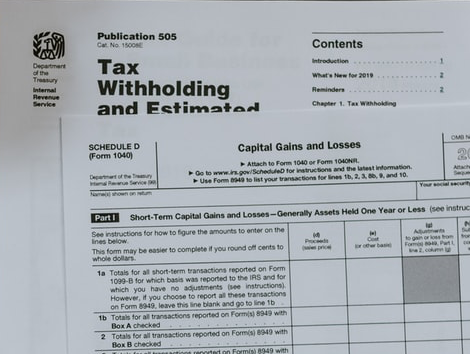by Fred Fuld III
A tax selling stock is a stock that is currently selling for a low price but was trading at much higher levels earlier in the year.
What is Tax Harvesting?
As the year-end approaches, many investors use the strategy called tax harvesting , which is selling stocks the have tanked to offset any gains that may have been established sometime during the year.
With strong selling, the price of stocks that have had big drops tends to fall far more than what would normally take place during the rest of the year.
What are Tax-Selling Bounce Stocks?
So traders and investors are on the lookout for tax selling bounce stocks that are heavily hit, hoping for a little (or big) bounce in January, once the tax selling is over.
Here are some stocks that are down over 75% year-to-date and have market caps in excess of $75 million. They are all based in the United States and re generating positive earnings.
| Company | Symbol | Market Cap | P/E | Price |
| reAlpha Tech Corp. | AIRE | 146.29M | 428.75 | 3.43 |
| Ebix Inc. | EBIX | 139.05M | 28.04 | 4.5 |
| Eagle Pharmaceuticals Inc | EGRX | 75.18M | 6.36 | 5.79 |
| Origin Materials Inc | ORGN | 99.19M | 1.96 | 0.69 |
reAlpha Tech Corp., a real estate technology company with a focus on short-term rentals, operates under two main segments: Platform Services and Investment Services.
Platform Services offer AI-powered products and services to real estate professionals, including data analytics, property management tools, and automated property valuations. Investment Services connect investors with fractional ownership opportunities in short-term rental properties.
The company has recently launched a new AI-powered rental pricing tool and expanded its portfolio to include Miami, Florida. With growing revenue and a focus on artificial intelligence, reAlpha Tech Corp. may be well-positioned to benefit from the booming short-term rental market.
Ebix Inc. is a leading international supplier of on-demand software and e-commerce services, primarily focusing on the insurance, financial, travel, cash remittance, and healthcare industries. The company operates globally, providing end-to-end solutions ranging from infrastructure exchanges and carrier systems to agency systems and risk compliance solutions.
Ebix boasts a comprehensive portfolio of services including software development, consultancy services, life insurance, risk management, health and employee benefits, CRM, and applications software for property and casualty insurance. Its expertise lies in developing and deploying insurance and reinsurance exchanges on an on-demand basis using software-as-a-service (SaaS) enterprise solutions. These solutions cover a wide range, encompassing customer relationship management, front-end and back-end systems, and outsourced administrative and risk compliance services.
Ebix leverages its expertise in consulting, systems design and integration, IT and business process outsourcing, applications software, and web and application hosting to cater to the individual needs of various organizations. This comprehensive approach positions Ebix as a leading player in the on-demand infrastructure exchange market for insurance, financial, and healthcare industries.
Eagle Pharmaceuticals, Inc. is a fully diversified pharmaceutical company dedicated to advancing safe and effective treatments for patients, healthcare providers, and the healthcare system as a whole. The company focuses its efforts on critical care and oncology, developing and commercializing injectable products in areas where there are unmet medical needs.
Eagle’s portfolio consists of four approved products:
- Argatroban: An injectable anticoagulant used to treat and prevent blood clots in patients with heparin-induced thrombocytopenia (HIT).
Ryanodex: The only FDA-approved treatment for exertional heatstroke, a life-threatening condition caused by excessive exertion in hot environments.
Belrapzo: A monoclonal antibody approved for the treatment of adult patients with chronic lymphocytic leukemia (CLL) and indolent B-cell non-Hodgkin’s lymphoma (NHL) who have failed or are intolerant to bendamustine and rituximab.
Bendeka: A liposomal encapsulation of bendamustine, a chemotherapy drug used to treat patients with CLL and indolent NHL.
Origin Materials, Inc. is a leading carbon-negative materials company on a mission to enable the world’s transition to sustainable materials. Their innovative platform transforms the carbon found in sustainable biomass, like wood residues and agricultural waste, into useful materials like bioplastics, biofuels, and carbon black. This process eliminates the need for fossil resources and captures carbon in the process, making Origin’s products truly carbon-negative.
Origin’s technology boasts several significant advantages. Their bio-based materials offer comparable performance to traditional petroleum-based materials while significantly reducing greenhouse gas emissions. This makes them attractive to companies seeking to reduce their environmental footprint and contribute to a more sustainable future. Additionally, Origin’s platform is highly scalable, allowing them to produce large quantities of their products to meet the growing demand for sustainable materials.
Currently, Origin is focused on two key markets:
- Advanced bio-textiles: These bio-based alternatives to traditional textiles can be used in a variety of applications, including clothing, automotive interiors, and medical textiles.
- Carbon black: This essential material is used in a variety of industrial applications, including tires, rubber products, and inks. Origin’s bio-based carbon black offers superior performance and environmental benefits over traditional carbon black derived from fossil fuels.
Origin may be well-positioned to capitalize on the growing demand for sustainable materials.
Hopefully, another investor’s loss can be your gain. However, keep in mind that these are all very low cap stocks and they may have been dropping substantially for a reason.
Disclosure: Author didn’t own any of the above at the time the article was written.


